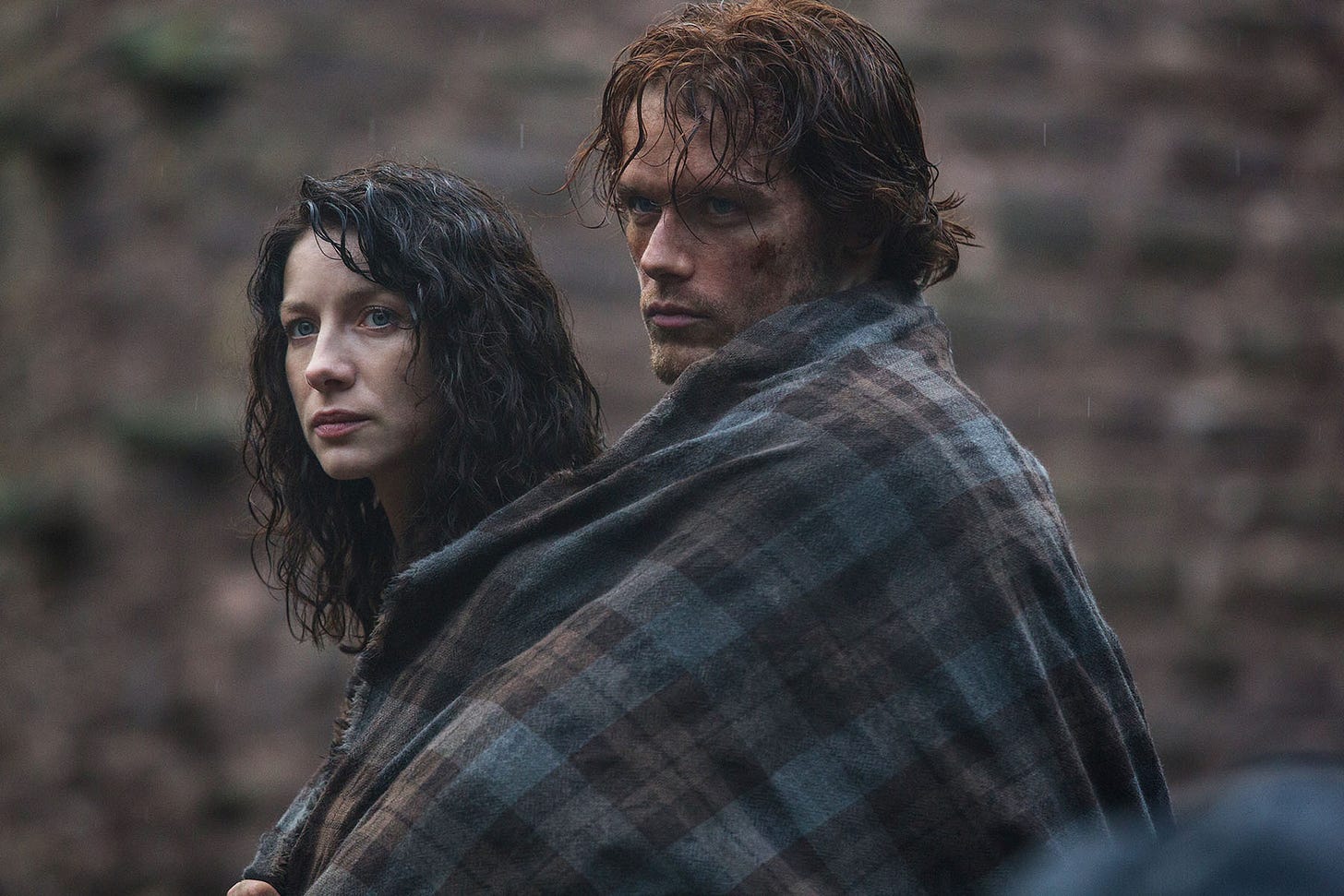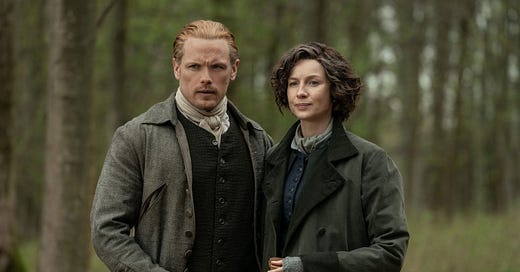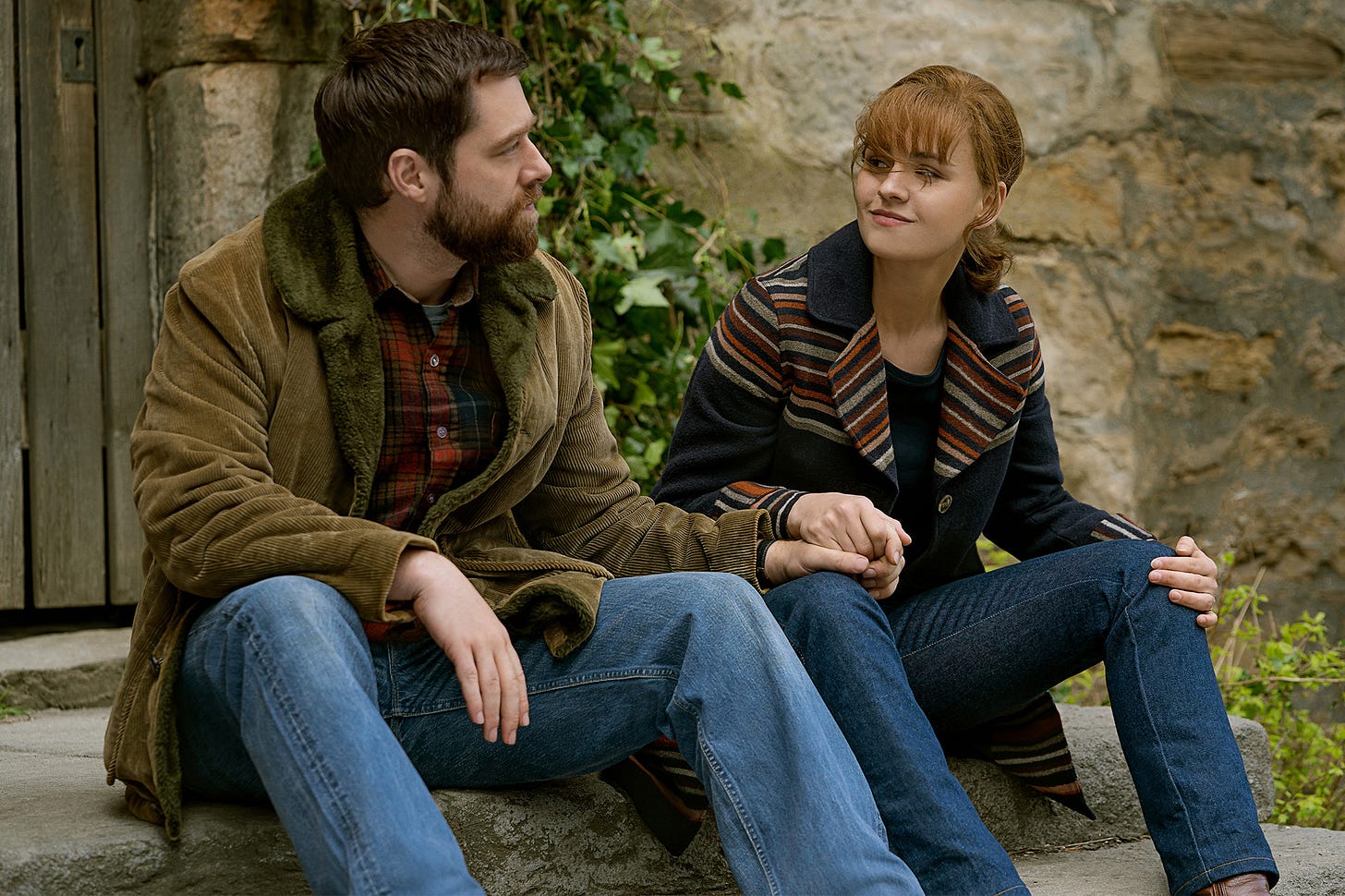Outlander: Season 7, Part I: The Off-Balance Review.
As the show heads into another hiatus, it does so on a high note.
The mid-season finale of Outlander’s seventh season has been out in the wild for over a week now. So if you haven’t watched it yet, consider this your spoiler warning. No pressure.

As Outlander’s mid-season finale concluded, Jamie (Sam Heughan) couldn't hide his smile.
And neither could I.
For our favourite Highlander, it was a homecoming over two decades in the making: finally, difficult circumstances notwithstanding, he had returned home to his native Scotland, with his nephew and wife by his side.
For me, it was the capper on what has been, easily, the show’s strongest eight-episode stretch since the back-half of the second season.
Vintage Outlander.
It has been a long time coming.
Outlander, adapting the best-selling book series of the same name by author Diana Gabaldon, was an immediate success when it premiered in August of 2014.
It struck a rare balancing act, appealing to both long-time fans of the franchise (the first book was published in 1991) and newcomers who were captivated by the story’s unique mix of historical, science and adventure-romance fiction.
Caitríona Balfe was Claire, an English combat nurse. After returning from service in the Second World War and honeymooning in the Scottish Highlands, she found herself mysteriously sent back in time to 1743 by way of the standing stones at (the fictional) Craigh na Dun.
There, she would meet and later fall in love with Jamie Fraser, a daring Highland warrior. With the Jacobite uprising of 1745 looming, together, they would attempt to change history and stop the doomed rebellion however they could.
For the uprising would lead to the Battle of Culloden in April of 1746 and from Culloden, disaster - a decisive English victory, all but destroying the Scottish clan system and the dream of independence.
This, for me, was when the show was at its absolute best, as it adapted Gabaldon’s first two novels, Outlander and Dragonfly in Amber.
The show would never be hundred-percent accurate, of course but it respected both Gabaldon’s story and the real-world history it was fictionalizing, while working hard to capture the essence of 18th-century Scotland (and in the first half of the second season, the royal courts of France).
It quickly became a world that was one of the richest on television.
Characters spoke Gaelic, wore kilts and drank whiskey like it was going out of style.
The sheer beauty of the Highlands, from the countryside, passes crawling with Redcoats or the quaintness of Jamie’s ancestral home of Lallybroch, were captured in sweeping wide shots or more intimate framing, bringing a lived-in quality to every stitch and seam.
It helped that Outlander was actually being shot on location, in Scotland (and accented by the terrific work of composer Bear McCreary, who has scored all seven seasons of the show).
The interconnected minutia of the storytelling itself though, was perhaps the show’s biggest strength. Those first 29 episodes were something akin to a series of building blocks - each one, in story and character, one after the other, leading to something bigger.
They tackled difficult topics, from gender roles and masculinity past and (1940s) present, to the true cost of war and the loss of loved ones.
Highlighted too, was the long-term mental health impact of rape and sexual violence - which, graphic content aside, was presented with the upmost respect in regard to the scars carried by survivors.
Was it always perfect? No, it wasn’t and at times, you could almost see the show nearly buckling under its own weight (“Wentworth Prison”, the fifteenth episode of the show’s first season, is an incredibly harrowing watch when it comes to that graphic content disclaimer).
But ultimately, the larger narrative never lost sight of its end goal in Culloden nor developing characters with a clear through-line in mind.
It was something the show’s large ensemble and its leads specifically, understood to a tee.

Balfe and Heughan seemed to have an inherent grasp on their characters from the very beginning, both, mastering challenging roles levied with impossible expectations.
Claire was a woman out of time, who, while highly capable, intuitive and markedly confident, was, oftentimes, torn between her new life in the past and the one she left behind in the 1940s.
Balfe played her effortlessly - as Claire grew in depth, so too, did her performance, layers of complexity she made look easy.
And Heughan brought an incredible sense of humanity to Jamie that, at first glance, you wouldn’t suspect. A battle-hardened warrior masking sly intelligence and humour, Jamie was a man defined by trauma and tragedy yet still capable of tremendous compassion, a tricky combination which Heughan absolutely nailed.
They played off each other incredibly well, the relationship between their characters, one that grew organically and with believability, as they became the emotional centre of a story where they weren’t always the focus:
Laura Donnelly, was Jenny, Jamie’s strong willed but loving sister. Donnelly brought a tremendous energy to the role, easily commanding each and every scene in which she appeared.
Graham McTavish was Dougal, Jamie’s uncle and the cunning War Chief of Clan MacKenzie. McTavish played him with a hidden, burning rage, expertly straddling a morally grey line his character was never afraid to cross.
We had Andrew Gower, playing Bonnie Prince Charlie to perfection and Duncan Lacroix as Jamie’s godfather Murtagh, who took a role that was greatly expanded from the books and made it his own.
There was Lotte Verbeek as Geillis, a woman, like Claire, hiding mysterious secrets, who Verbeek embodied with relish.
And then, we had Tobias Menzies in a dual-role for the ages. In the 1940s, he was Frank Randall, Claire’s kind-hearted, historian husband. But in 18th-century Scotland, he was Frank’s ancestor, Jonathan “Black Jack” Randall, a sadistic military officer who Menzies played so well, your skin would crawl every time he appeared on screen.
All of them, in tandem, with everything else the show did right, made Outlander something that had few equals on broadcast television.
But nothing that good can last forever.
Now, that isn’t to say that the following four-and-a-half seasons have been wholly disappointing, far from it.
Yet, when the Culloden arc concluded at the beginning of the third season, you could almost see it - the show’s sense of momentum, grinding to a halt.
And that happens with serialized work and long-running TV shows specifically, as they must reorient themselves for long-term success.
But Outlander, beholden to the books it was adapting, openly struggled to recapture the structure that so clearly defined its first two seasons.
Part of that, was because of what it was building towards next: The American Revolution. The issue being, that conflict was decades away.
So there was a transitional period that, for me, didn’t land as well as it could have, as the show’s makeup fundamentally changed.
Most prominently, the storytelling went through some growing pains.
Was it because Outlander played its hand too early?
As the show moved into its middle seasons, trying to introduce various new characters and wide-reaching storylines, even if you never read the books or followed along with the promotional material, the basic beats became far too predictable.
It was never a show that shied away from depicting the difficult reality of life in the 18th-century either but its over-reliance on cliffhanger tropes (“Oh no! Claire’s been kidnapped!/Accused of witchcraft!) started to become tiresome, as did its dependance on rape and sexual violence as plot devices.
It wasn’t like the show-runners were unexperienced presenting such material. Yet unlike previous seasons, where, above all, character growth took precedence, too often it just felt like shock-value attempts to manufacture tension, as the long-game, the Revolution, was still seasons off.
And as the story eventually moved to the colonies, it took something with it too.
See, the production itself never left Scotland, forcing the show to mask it under pretty obvious set work as it doubled for North Carolina. A sense of character that was so proudly displayed previously, now suppressed.
In time too, we would come to know a new supporting cast that, while played strongly, could never establish the same level of investment that was held in those they were replacing (with John Bell’s Young Ian and David Barry’s Lord John, the exceptions).
But over these past eight episodes, the first half of its seventh season? I realized, I wasn't as hyper-concentrated on what wasn’t working anymore.
Instead, I was engaged, eagerly awaiting the next episode’s release, week-to-week, just as I was, years ago. I couldn’t help but wonder.
What took them so long?

For one, the Revolution proper began. No longer forced to present flavour-of-the-week type stakes, now, there was heightened conflict, once again, baked into the overarching narrative.
All of Outlander’s spinning plates, finally, with a place on the shelf:
Claire and Jamie, on the front lines and though aware of history’s outcome, powerless to change it.
Roger and Brianna (Richard Rankin and Sophie Skelton), who, after years of struggling to build any sort of forward momentum in their storylines, were now, among the show’s best as they grappled with what they considered to be their true purpose (and place in time).
There was the further development of Young Ian, as he became, for all intents and purposes, the show’s third lead.
And then there was the introduction of a now-adult William Ransom (Charles Vandervaart), who, no longer the young boy with the complex past we knew in earlier seasons, is a success-driven military officer, slowly realizing that war is not as black-and-white as he believed it to be.
The production values were still excellent, the soundtrack, still haunting and the performances, still impressive but Outlander, at last, remembered the importance of tying all those elements together with its storytelling.
The bigger question is, what’s next?
The second half of the seventh season is set to premiere sometime in 2024 but it was announced earlier this year that Outlander will be ending with its eighth season (there is also a prequel series on the way).
Gabaldon has yet to publish her tenth and presumably final novel, but she has been with the show every step of the way, from writing individual episodes, producing and general creative oversight. Her voice carries weight and even though she may not be a showrunner, it seems unlikely that she wouldn’t be involved in seeing the show come to an end, as well.
The catch, will be to maintain this momentum they’ve established as they move into their final stretch of episodes. It’ll be a challenge but one, I do believe, they’re up too.
Until then? Into the “Droughtlander” we go.





